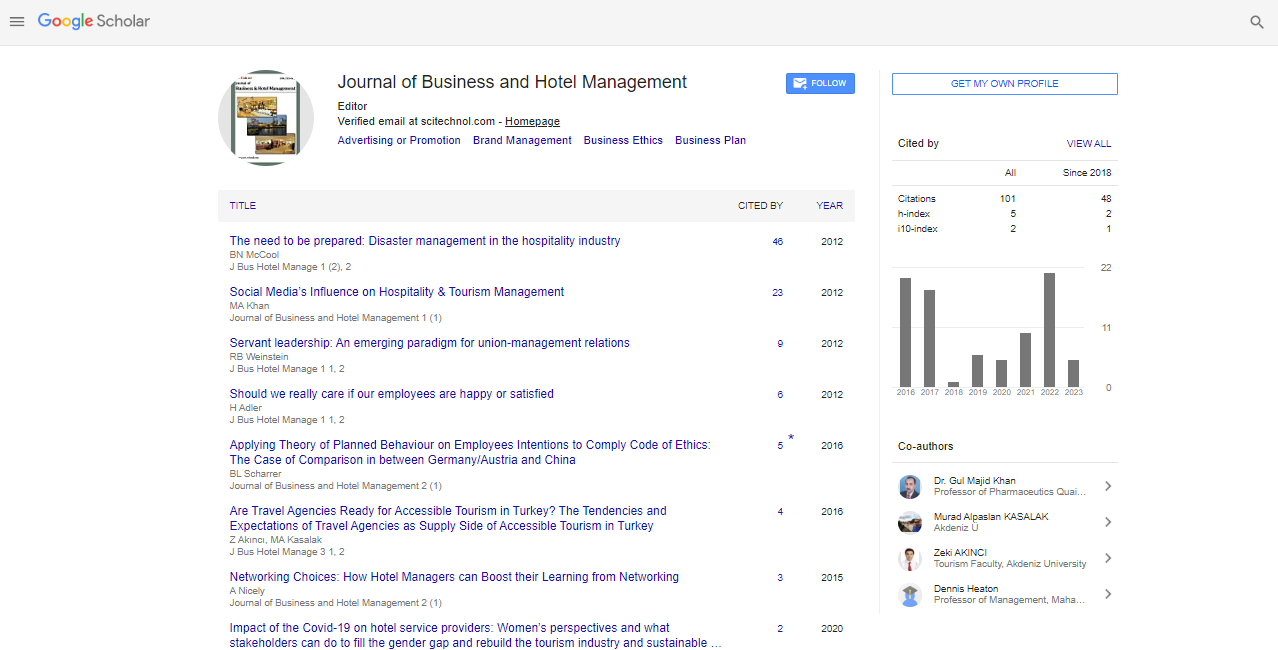Opinion Article, J Bhm Vol: 9 Issue: 2
The Ultimate Guide to Hotel Management: Strategies for Success and Customer Satisfaction
Fernando Garcia*
Department of Hotel Management, University of East Anglia, Norwich, United Kingdom
*Corresponding Author: Fernando Garcia
Department of Hotel Management, University of East Anglia, Norwich, United
Kingdom
E-mail: garciaf38@gmail.com
Received date: 15 May, 2023, Manuscript No. JBHM-23-107993;
Editor assigned date: 17 May, 2023, PreQC No. JBHM-23-107993 (PQ);
Reviewed date: 31 May, 2023, QC No. JBHM-23-107981;
Revised date: 08 June, 2023, Manuscript No. JBHM-23-107993 (R);
Published date: 16 June, 2023, DOI: 10.4172/2324-9129.1000139
Citation: Garcia F (2023) The Ultimate Guide to Hotel Management: Strategies for Success and Customer Satisfaction. J BHM 9:2.
Description
Running a successful hotel requires more than just offering comfortable accommodations and good service. Hotel management is a complex endeavor that involves a multitude of tasks, from staff training and facility maintenance to marketing and customer satisfaction. In this ultimate guide, we will delve into essential strategies for hotel management that will not only ensure the success of establishment but also foster a high level of customer satisfaction.
One of the cornerstones of successful hotel management is investing in staff training and development. Well-trained and motivated employees are key to delivering exceptional service to guests. Conduct regular training sessions to enhance their skills in customer service, communication, and problem-solving. Empower them to handle challenging situations and provide them with the necessary resources to excel in their roles.
In the digital age, technology plays an essential role in optimizing hotel management processes. Implementing an efficient property management system can streamline tasks like reservations, check-ins, and check-outs, ensuring a smooth and hassle-free experience for guests. Moreover, leverage online platforms and social media to engage with potential customers and produce a strong online presence.
Cleanliness is non-negotiable in the hospitality industry. Ensure that hotel maintains the highest standards of hygiene throughout the premises, from the lobby and rooms to the dining areas and amenities.
Regularly inspect and clean all areas, and promptly address any guest concerns related to cleanliness.
Personalization is becoming increasingly important in the hospitality sector. Collect guest data and preferences to tailor their experiences during their stay. Whether it's greeting guests by their names or offering personalized recommendations for local attractions, these small gestures can leave a lasting positive impression.
In today's digital world, potential guests often rely on online reviews and ratings to make their hotel choices. Therefore, it is vital to actively manage hotel's online reputation. Encourage satisfied guests to leave positive reviews and promptly address any negative feedback to demonstrate commitment to guest satisfaction.
Sustainability is not just a buzzword; it has become a precarious aspect of the hotel industry. Implement eco-friendly practices such as energy-efficient lighting, water conservation, and waste reduction. Promote local culture and support local businesses to contribute positively to the community.
Guests must feel safe and secure during their stay. Install adequate security measures, including surveillance cameras, well-trained security personnel, and secure entry systems. Regularly inspect safety equipment and conduct emergency drills to prepare staff for any unforeseen situations.
Offering a range of engaging activities and amenities can enhance the overall guest experience. Depending on hotel's location and target audience, consider incorporating features such as spas, fitness centers, swimming pools, or guided tours. Engaging activities can leave a positive impression and encourage guests to return in the future.
Collaborating with local businesses can benefit both hotel and the community. Partner with nearby restaurants, tour operators, or entertainment venues to provide added value to guests' experience. These partnerships can also result in mutual referrals and a stronger local network.
Conclusion
Effective hotel management requires a multifaceted approach that prioritizes customer satisfaction and operational excellence. By implementing the strategies outlined in this ultimate guide, ensure hotel's success and produce a positive and memorable experience for guests. Remember, continuous improvement and a customer-centric mindset is the keys to thrive in the competitive hospitality industry.
